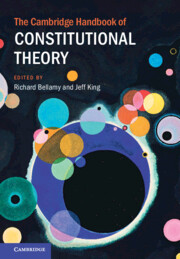Book contents
- The Cambridge Handbook of Constitutional Theory
- The Cambridge Handbook of Constitutional Theory
- Copyright page
- Contents
- Figures
- Contributors
- Frontispiece
- Preface and Acknowledgements
- 1 Introduction
- Part I Values
- Part II Modalities
- Part III Institutions
- Part III. A The State
- 30 The State
- 31 The Material Constitution
- 32 Federalism
- 33 Consociationalism
- 34 Corporatism
- 35 Guarantor (or the So-called “Fourth Branch”) Institutions
- 36 Central Banks
- Part III. B The Executive
- Part III. C The Democratic System
- Part III D The Legal System
- Part III E The Global System
- Part IV Challenges for Constitutional Democracy
- Bibliography
- Index
- References
35 - Guarantor (or the So-called “Fourth Branch”) Institutions
from Part III. A - The State
Published online by Cambridge University Press: 27 March 2025
- The Cambridge Handbook of Constitutional Theory
- The Cambridge Handbook of Constitutional Theory
- Copyright page
- Contents
- Figures
- Contributors
- Frontispiece
- Preface and Acknowledgements
- 1 Introduction
- Part I Values
- Part II Modalities
- Part III Institutions
- Part III. A The State
- 30 The State
- 31 The Material Constitution
- 32 Federalism
- 33 Consociationalism
- 34 Corporatism
- 35 Guarantor (or the So-called “Fourth Branch”) Institutions
- 36 Central Banks
- Part III. B The Executive
- Part III. C The Democratic System
- Part III D The Legal System
- Part III E The Global System
- Part IV Challenges for Constitutional Democracy
- Bibliography
- Index
- References
Summary
Guarantor institutions (such as electoral commissions and anti-corruption watchdogs, which supposedly comprise the so-called ‘fourth’ or ‘integrity’ branch of the state) are increasingly of interest to constitutional scholars. In a given political context, a guarantor institution is a tailor-made constitutional institution, vested with material as well as expressive capacities, whose function is to provide a credible and enduring guarantee to a specific non-self-enforcing constitutional norm (or any aspect thereof). Arguing that guarantor institutions are more trustee-like than agent-like in character, this chapter defends the claim that the design of any guarantor institutions should seek to ensure that it has: (i) sufficient expertise and capacity to perform its functions effectively; (ii) sufficient independence from political, economic, or social actors with an interest in frustrating the relevant norm it is meant to guarantee; and (iii) sufficient accountability to bodies with an interest in upholding the relevant norm.
Keywords
- Type
- Chapter
- Information
- The Cambridge Handbook of Constitutional Theory , pp. 603 - 621Publisher: Cambridge University PressPrint publication year: 2025

